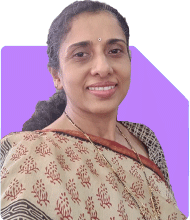32-year-old engineer, confused about career switch: Bits Pilani ECE vs DTU MnC vs Bits Hyderabad CSE vs IIT Ropar Mech?
Nayagam P P |10931 Answers |Ask -Follow
Career Counsellor - Answered on Jul 07, 2024
He started his career as an HR professional and has over 10 years of experience in tutoring and mentoring students from Classes 8 to 12, helping them choose the right stream, course and college/university.
He also counsels students on how to prepare for entrance exams for getting admission into reputed universities /colleges for their graduate/postgraduate courses.
He has guided both fresh graduates and experienced professionals on how to write a resume, how to prepare for job interviews and how to negotiate their salary when joining a new job.
Nayagam has published an eBook, Professional Resume Writing Without Googling.
He has a postgraduate degree in human resources from Bhartiya Vidya Bhavan, Delhi, a postgraduate diploma in labour law from Madras University, a postgraduate diploma in school counselling from Symbiosis, Pune, and a certification in child psychology from Counsel India.
He has also completed his master’s degree in career counselling from ICCC-Mindler and Counsel, India.
... more

Sir pls tell which is better BITS PILANI Ece vs DTU MnC vs BITS hyd CSE IIT Ropar mech
To know more on ‘ Careers | Education | Jobs’, ask / Follow Us here in RediffGURUS.
You may like to see similar questions and answers below
Chocko Valliappa |544 Answers |Ask -Follow
Tech Entrepreneur, Educationist - Answered on Jul 20, 2024
Dr Dipankar Dutta |1856 Answers |Ask -Follow
Tech Careers and Skill Development Expert - Answered on Aug 05, 2024
Prof Suvasish Mukhopadhyay | Answer |Ask -Follow
Career Counsellor - Answered on Jul 05, 2025
Radheshyam Zanwar |6825 Answers |Ask -Follow
MHT-CET, IIT-JEE, NEET-UG Expert - Answered on Mar 02, 2026
Ravi Mittal |706 Answers |Ask -Follow
Dating, Relationships Expert - Answered on Mar 02, 2026
Ravi Mittal |706 Answers |Ask -Follow
Dating, Relationships Expert - Answered on Mar 02, 2026
Patrick Dsouza |1453 Answers |Ask -Follow
CAT, XAT, CMAT, CET Expert - Answered on Mar 02, 2026
Nayagam P P |10931 Answers |Ask -Follow
Career Counsellor - Answered on Mar 02, 2026
Nayagam P P |10931 Answers |Ask -Follow
Career Counsellor - Answered on Mar 02, 2026
Dr Deepa Suvarna |177 Answers |Ask -Follow
Paediatrician - Answered on Mar 02, 2026
Ramalingam Kalirajan |11047 Answers |Ask -Follow
Mutual Funds, Financial Planning Expert - Answered on Mar 02, 2026
Ramalingam Kalirajan |11047 Answers |Ask -Follow
Mutual Funds, Financial Planning Expert - Answered on Mar 02, 2026
T S Khurana |558 Answers |Ask -Follow
Tax Expert - Answered on Feb 28, 2026



























